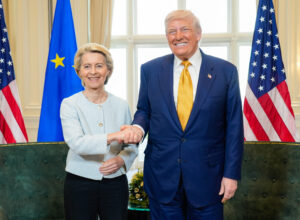Po sukcesie książek o Protektoracie Czech i Moraw Piotr M. Majewski w swojej najnowszej książce Brzydkie słowo na „k” przygląda się zjawisku kolaboracji, sięgając po przykłady z historii Polski i Europy od czasów starożytnych. Zapraszamy na spotkanie premierowe z autorem, które odbędzie się 6 listopada o 19 w Nowym Teatrze w Warszawie. Poprowadzi je Michał Nogaś, a fragmenty książki przeczyta Renata Dancewicz. Wstęp na wydarzenie jest bezpłatny.
**
Michał Sutowski: Kolaborację definiuje pan jako współpracę kraju podbitego – jego elit lub mieszkańców – z władzami okupacyjnymi, do tego wbrew przynajmniej części współobywateli. Znajdziemy liczne przykłady na to, że „kolaborantem jest się zawsze dla kogoś, z czyjejś perspektywy, w danych warunkach; poparcie społeczne dla kolaborującej elity politycznej rozciąga się na spektrum od szerokiego przyzwolenia społecznego po powszechne przekonanie o zdradzie”. Ale czy dziś, gdzieś w Europie broni się – w głównym nurcie, poza skrajną prawicą – decyzji o wojennej kolaboracji z Niemcami hitlerowskimi?
Piotr M. Majewski: Silny jest nurt rewizjonistyczny na Słowacji, który dość konsekwentnie broni ks. Josefa Tiso i jego polityki współpracy z Niemcami. Z kolei w państwach bałtyckich właściwie główny nurt opinii publicznej uważa, że współpraca z Niemcami przeciwko Sowietom była wyrazem troski o rację stanu. Której częścią było, dodajmy, oczyszczenie kraju z mniejszości narodowych, szczególnie żydowskiej. Podobnie myśli też część Ukraińców, dla których Stepan Bandera jest bohaterem narodowym, nawet jeśli dziś nie jest to już bohater „bez skazy”.
Ale to jest akurat przykład kolaboracji… nieudanej. Bandera chciał ukraińskiego państwa w Galicji i na Wołyniu, analogicznego do protektoratów niemieckich w rodzaju Chorwacji Pavelicia czy Słowacji Tiso. Dlaczego nic z tego nie wyszło?
Bo Niemcy nie życzyli sobie państwowości ukraińskiej, wszystko jedno, czy na czele z Melnykiem, czy Banderą. Interesowała ich tylko współpraca na poziomie administracyjnym, policyjnym, oczywiście także wojskowym, i ona faktycznie miała miejsce na dużą skalę. Przynajmniej przez pewną część Ukraińców, na zachodzie całkiem dużą, była ona traktowana jako pewna szansa na własne państwo – terytorialna zbieżność z dawną austriacką Galicją jest tu nieprzypadkowa. Bo chociaż na wschodzie też współpracowano z Niemcami, opór wobec tej współpracy był większy. Na podobnej zasadzie Polacy postrzegali współpracę z państwami centralnymi w czasie I wojny światowej. Ta analogia jest bardzo wyraźna, choć oczywiście Polacy w imię współpracy z Austro-Węgrami czy Niemcami kajzerowskimi nie mordowali Żydów ani nie dopuścili się wielkiej czystki etnicznej.
Mówi pan, że Niemcy sobie nie życzyli państwowości ukraińskiej – ale słowackiej już tak.
Podobnie chorwackiej: obydwa narody „dostały” od III Rzeszy swoje państwa, marionetkowe, ale jednak państwa. Czesi też utrzymali pewien rodzaj państwowości, ograniczonej, ale jednak cały aparat państwowy w Protektoracie Czech i Moraw był czeski, włącznie z symbolicznymi siłami zbrojnymi. Z kolei Ukraińcy nie dostali państwa, Bałtowie nie dostali, a Białorusini jakieś namiastki, ale to ze względu na prywatne poglądy tamtejszego gauleitera. Innymi słowy, polityka niemiecka w kwestii kolaboracji była – jak w przypadku wielu imperiów, również w długim ujęciu historycznym – mocno niekonsekwentna.
Były jakieś reguły? Jakieś stałe kryteria – komu się należy, a komu nie?
Były oczywiście reguły rasowe. Trudno byłoby wyobrazić sobie jakieś państwo żydowskie, które Hitler zgodziłby się utworzyć, aczkolwiek instrumentalnie wykorzystywał tzw. Judenraty jako pewną formę żydowskiej autonomii. Do tego pamiętajmy, że te wszystkie państewka nie były projektami na zawsze – wszystkie te „eksperymenty słowiańskie” byłyby z czasem wygaszane. Widać to dobrze na przykładzie Czech.
Oni też byli do likwidacji?
Kiedy Niemcy mieli poczucie, że są na fali wznoszącej, w związku z pierwszymi sukcesami na froncie wschodnim, zaczęli mówić, że jest im potrzebne… 7 milionów trumien, żeby problem czeski rozwiązać – to słowa jednego z niemieckich urzędników w Protektoracie. Kiedy to było Hitlerowi potrzebne i kiedy te narody się poddawały, on był gotów to wynagradzać, ale nie zmieniało to faktu, że np. Czechów Hitler ewidentnie nienawidził, uważał za dużo bardziej uciążliwych Słowian niż Polaków, choć zarazem trochę bardziej szanował, bo to byli dla niego tacy na pół zniemczeni Słowianie.
A nienawidził ich za co?
Nie podobało mu się, że przed I wojną światową robili kariery i pieniądze w Wiedniu. Według niego to właśnie przez Czechów pojawiły się problemy, to oni rozbijali monarchię habsburską od wewnątrz. No i jeszcze trzeba powiedzieć o jego obsesji rasowej: skoro Czesi są tacy upodobnieni do Niemców, to są tym bardziej niebezpieczni, bo jednak mimo zewnętrznych pozorów zachowali swoją słowiańską tożsamość. Mówił, że są jak rowerzyści: zginają grzbiet, ale pedałują w swoim kierunku. To trochę tak jak z wyobrażeniem Hitlera o Żydach, które wbrew pozorom nie opierało się tylko na bezgranicznej pogardzie: że brudni, zacofani i śmierdzą czosnkiem, ale także wyrażało lęki, że tacy sprytni, niebezpieczni, że się łatwo asymilują, upodabniają do większości – a jednocześnie pozostają esencjalnie obcy.
Zaraz, czy to znaczy, że Czechów nienawidził bardziej niż Polaków? To trochę paradoksalne, biorąc pod uwagę prowadzoną przez III Rzesze politykę…
Polakom Hitler składał w swoim przekonaniu bardzo korzystną ofertę współpracy przed wybuchem II wojny światowej. Sądził, że Polska będzie jego czołowym, choć oczywiście słabszym sojusznikiem w Europie Środkowej. I trochę z rozczarowania odrzuceniem tej oferty wynikała chyba furia, z jaką później polskość była przez Niemców tępiona. Oczywiście rodaków nie musiał długo przekonywać: wystarczyło odgrzać antypolskie stereotypy, które istniały i w Republice Weimarskiej, i wcześniej w kajzerowskiej Rzeszy. Niemcy tępili Polaków pomimo faktu, że taka polityka była dość kosztowna: do utrzymania spokoju we Francji czy w Protektoracie Czech i Moraw potrzeba było dużo mniej sił i środków niż w okupowanej Polsce.
Rozumiem, że o traktowaniu narodu podbitego – i dopuszczeniu choćby jakiejś formy kolaboracji – decydują czasem czynniki arbitralne, jakieś obsesje czy uprzedzenia lidera panującego imperium. Ale w czym dla Hitlera tacy np. Ukraińcy byli gorsi od Chorwatów? Przecież Organizacja Ukraińskich Nacjonalistów była zaprzyjaźniona z nacjonalistami chorwackimi.
Dużą rolę odgrywała geografia i potrzeby strategiczne – czynnik rasowy wpływał na nie pośrednio, poprzez niemieckie plany kolonizacyjne. Ukraina była przestrzenią do ekspansji niemieckiego osadnictwa na wielką skalę, natomiast Chorwacja nie. Podobnie było z Czechami – te dalekosiężne plany „rozwiązywania problemu czeskiego” wynikały z faktu, że to był niemiecki obszar osadniczy z dużymi skupiskami Niemców w enklawach typu Brno czy Ołomuniec. W czasie okupacji urzędnicy niemieccy planowali stopniowe rozczłonkowanie terenów etnicznie czeskich. W tym celu tworzono na nich np. poligony wojskowe.
A czy wschód i zachód Europy – z punktu widzenia III Rzeszy – to były różne światy, jeśli chodzi o samo dopuszczenie możliwości kolaboracji?
Oczywiście. Nieco upraszczając, można powiedzieć, że na zachodzie Europy, który obejmowałby również Skandynawię i ziemie czeskie, panował jednak inny model okupacji. Tam zakładała ona co do zasady współpracę z miejscowymi elitami społecznymi i władzami, przynajmniej administracyjnymi. Natomiast na wschodzie była to polityka czysto kolonialna przechodząca w eksterminacyjną.
Ale Żydów mordowano i na wschodzie, i na zachodzie.
To prawda, ale Niemcy robili to innymi metodami. Nawet w Protektoracie Czech i Moraw nie mordowano ich publicznie, nawet w getcie Theresienstadt miała miejsce tylko jedna taka egzekucja. Jeśli ktoś podpadł, to wywozili go do niedużej twierdzy tuż obok, gdzie było więzienie Gestapo, i tam ich mordowali.
Z czego wynikała ta hipokryzja? I jej brak gdzie indziej?
Sądzę, że była to próba zaprezentowania się przez Niemców jako naród cywilizowany, który dotrzymuje pewnych standardów, również wobec własnych obywateli. W Rzeszy przecież także nie mordowano Żydów publicznie, jeśli pominąć pogromy w czasie Nocy Kryształowej czy pojedyncze mordy niedługo po przejęciu władzy przez nazistów. Podobnie zresztą na polskich terenach wcielonych do Rzeszy, np. w Poznańskiem: wywożono ich raczej do Fortu VII, albo do różnych gett i obozów. Obozy koncentracyjne w Auschwitz i Stutthof, a także obóz zagłady w Chełmnie nad Nerem znajdowały się wprawdzie na terenach włączonych do Rzeszy, ale z daleka od oczu zdecydowanej większości Niemców. Im dalej na wschód, tym względy natury, estetycznej czy formalno-prawne, po prostu słabły.
Timothy Snyder w Czarnej ziemi stawiał tezę, że z punktu widzenia przeżywalności Żydów w okupowanej Europie istnienie lokalnej – a zatem kolaboracyjnej – administracji, lokalnego marionetkowego państwa, było raczej zaletą. Pan się z tym zgadza?
Co do zasady tak, przynajmniej z punktu widzenia miejscowych Żydów, którzy mieli obywatelstwo danego państwa. Właściwie wszystkie państwa, które były sojusznikami Rzeszy, bądź państwa, których władze jednoznacznie kolaborowały: francuskie Vichy, Węgry, Rumunia Antonescu, wszystkie te państwa w imię swoiście pojmowanej niezależności od Niemiec broniły swoich obywateli pochodzenia żydowskiego, natomiast gotowe były wydawać na śmierć ludzi, którzy byli obcy: bezpaństwowców, ale także tych, którzy – to przypadek francuski – późno uzyskali obywatelstwo.
Czyli nie byli „prawdziwymi” francuskimi Żydami?
Przyjęto cezurę 1925 roku – jeśli ktoś był późniejszym imigrantem do Francji, weryfikowano jego status. Czasem zostawiano obywatelstwo, czasem odbierano. W tym drugim przypadku osoby te były najczęściej ofiarami wywózek – najpierw na stadion kolarski Vel’ d’Hiv’, a później do obozów zagłady.
A co się dzieje z tymi, którzy zachowali francuskie obywatelstwo?
Oni na ogół przeżyli, bo jednak władze ich chroniły, przynajmniej opóźniały wywózki. Byli niejako ostatni w kolejce. Gdyby wojna potrwała dłużej, Niemcy by się i za tę grupę też wzięli, oczywiście z pomocą Francuzów. Przecież już w roku 1943 Niemcy płynnie przechodzą od współpracy ze starym marszałkiem Pétainem do współpracy z bardziej radykalnymi politykami z Pierre’em Lavalem na czele oraz milicją, która była jednoznacznie faszystowska i bardzo gorliwie uczestniczyła w wyłapywaniu Żydów, w tym żydowskich dzieci.
Na tle państw współpracujących z III Rzeszą negatywnie wyróżnia się chyba Słowacja – ich rząd dopłacał Niemcom 500 marek od każdego Żyda wywiezionego do obozu. Z czego to wynikało?
Akurat te opłaty to raczej z czystej perfidii: Niemcy zażądali „pokrycia kosztów” i byli w stanie to wyegzekwować, bo Słowacja była całkowicie od nich zależna. Ale władze słowackie faktycznie uważały to, co robi Hitler z Żydami, za historyczną okazję do powstania kraju monoetnicznego. Alexander Mach, minister spraw wewnętrznych i czołowy polityk proniemiecki w tym kraju, mówił wprost, że to jest szansa, którą Słowacy muszą wykorzystać. To się wpisywało w ewolucję słowackiej polityki, która częściowo pod wpływem niemieckim, ale częściowo immanentnie nabierała antysemickiego rozmachu.
„Słowackiej”, w sensie państwa słowackiego powstałego w marcu 1939 roku?
Tak, w tej marionetkowej republice utworzonej na gruzach Czechosłowacji Żydzi byli stopniowo wykluczani, począwszy od przyjętej wówczas konstytucji. Znajdowały się w niej kuriozalne antysemickie zapisy, że np. Żydom nie wolno wchodzić do parków i lasów. Zostali pozbawieni obywatelstwa, choć byli traktowani jako „przynależni” do państwa słowackiego, a później został uchwalony specjalny kodeks antysemicki. Deportacja prawie 60 tysięcy osób do obozów zagłady była już logiczną konsekwencją tego, co dokonało się wcześniej.
Bo niemiecki plan Zagłady zbiegał się ze słowackimi planami czystki etnicznej?
Analogiczną sytuację znajdziemy w faszystowskim państwie chorwackim: na podobnej zasadzie Chorwaci traktowali politykę Niemiec jako świetną okazję do czystki Serbów i Żydów, jak również do pewnego stopnia Romów. Uznano, że to elementy niepożądane, których można się pozbyć przy okazji współpracy z Niemcami.
A czy można wskazać jakiś schemat, jakieś kryteria wskazujące, które z państw podległych III Rzeszy stawiały jakiś opór polityce antysemickiej Niemiec, a które traktowały ją wręcz z entuzjazmem, jako doskonałą okazję na „zrobienie porządku” u siebie?
To była wypadkowa wielu czynników, niesprowadzalnych do ideologii kolaboracyjnego czy marionetkowego rządu w danym kraju. Hanna Arendt w swoim reportażu Eichmann w Jerozolimie wskazuje, że były takie przypadki, kiedy władze lokalne, również dzięki współpracy Judenratów, deportowały prawie wszystkich Żydów do obozów – tak było np. w Amsterdamie. Z drugiej strony mamy przypadki Danii i Bułgarii, których władze chroniły swoich Żydów dość skutecznie.
„Swoich”, czyli nieswoich już niekoniecznie?
Bułgarzy nie mieli problemu z odsyłaniem Żydów bezpaństwowców, natomiast ochronę swoich, podobnie jak Francuzi w pierwszych latach Vichy, traktowali jak wyraz potwierdzenia ich suwerenności. Inaczej niż w innych krajach, udało im się tę politykę utrzymać do końca wojny. Co prawda, jeden z ich lokalnych polityków, który odpowiadał za współpracę z Niemcami, bardzo się wciągnął w niemiecki sposób myślenia i podpisał zobowiązanie do wywózek z Głównym Urzędem Bezpieczeństwa Rzeszy, ale Bułgaria, dzięki postawie cara Borysa i innych polityków z obozu monarchistycznego doprowadziła do zablokowania tej decyzji.
W pana książce można dostrzec różne sposoby traktowania kolaborantów przez Niemców – Quislinga w Norwegii traktowali jak niegroźnego przygłupa, wobec marszałka Pétaina, zwycięzcy spod Verdun w 1916, czuli chyba elementarny respekt. Ale czy któryś z rządów kolaboracyjnych zdołał wypracować jakąś podmiotowość, realną sprawczość wobec III Rzeszy?
O podmiotowości raczej trudno mówić, bo – jak staram się udowodnić w książce – konstytutywną cechą kolaboracji jest asymetria między okupantem i okupowanym. Taki układ sił zawsze decyduje o tym, że to okupant rozdaje karty. Co nie zmienia faktu, że tam, gdzie Niemcom zależało w sposób szczególny na utrzymaniu choćby spokoju społecznego, bywali skłonni iść na większe ustępstwa. Dobrym przykładem była Dania do 1943 roku, okupowana na innych zasadach niż wszystkie pozostałe państwa w Europie.
Pokojowa okupacja?
Tak, nawet była na to łacińska nazwa, occupatio pacifica. W tej okupowanej Danii zostały zachowane wszystkie struktury państwowe, był król i rząd, odbywały się nawet wybory – tylko w kraju stacjonowały oddziały niemieckie. Niemniej dowódca niemieckich sił okupacyjnych porozumiewał się z rządem duńskim przez Ministerstwo Spraw Zagranicznych. W różnych sprawach dochodziło oczywiście do nacisków i było stałe ryzyko wiążące się z odmową, niemniej Niemcy starali się działać na miękko.
Rozumiem, że znaczenie miał tu czynnik rasowy: Duńczycy to dla Niemców porządni Aryjczycy, nordycki typ itp. Ale były jakieś inne, pozarasowe powody takiego nietypowego podejścia?
Niemcy chcieli pokazać, zwłaszcza na użytek zachodu i północy Europy, że współpraca się opłaca, że nie wszędzie musi być tak jak w Polsce. Jeżeli tylko naród, który znajduje się w strefie okupowanej, jest „rozsądny” i jego władze też są „rozsądne”, to Niemcy będą z nimi rozsądnie postępować. Do pewnego stopnia podobnie było też na ziemiach czeskich, choć w bardziej zbrutalizowanej formie. A druga rzecz to względy czysto pragmatyczne, związane z polityką rolną. Dania była rezerwuarem produktów rolnych dla Niemiec, przede wszystkim mleka, masła i mięsa, więc nie warto było dożynać wydajnej gospodarki jakimiś drastycznymi represjami typu wojennego.
Czy gdzieś jeszcze Niemcy stosowali taką taktykę?
Chcieli zastosować podobny system w Norwegii, ale nie udało się, bo Quisling wprowadził ich w błąd. Zapewniał, że będzie tak samo, że sobie poradzi z nastrojami społecznymi, ale zawiódł, więc tamta okupacja była już bardziej brutalna. Natomiast pewne podobieństwa widać przy okupacji Wysp Normandzkich – Jersey, Guernsey i kilku mniejszych – położonych blisko wybrzeża francuskiego. To były takie niezależne państewka, które nie były częścią Zjednoczonego Królestwa, ale powiązane z koroną brytyjską pewnym rodzajem zależności feudalnych. Niemcy się tam zachowali bardzo, można powiedzieć, kulturalnie, bo wprawdzie aresztowali pewne kategorie osób (Żydów, komunistów albo tych, którzy nie oddali odbiorników radiowych), ale wobec lokalnych władz zachowywali pewne decorum. To wynikało, moim zdaniem, z rasowego przekonania, że jednak z ludem germańskim nie mogą się obchodzić tak jak ze Słowianami. A z drugiej strony Brytyjczycy mieli też „kontrargumenty”: gdyby Niemcy bardzo brutalnie potraktowali miejscową ludność angielską, to Brytyjczycy mogliby potraktować brutalnie Niemców w Iraku czy gdziekolwiek indziej, gdzie ci wpadliby w ich ręce.
A czy w przypadku Duńczyków ta pokojowa okupacja przekładała się na los żydowskiej społeczności?
Przełożyła się pozytywnie, bo Niemcy długo w ogóle nie ingerowali w kwestię żydowską w Danii. Zdecydowali się to zrobić dopiero w 1943 roku i się to nie udało. Władze duńskie początkowo zdecydowały się Żydów jakoś odizolować, prowadzono już na ten temat rozmowy, ale ostatecznie się wycofano. Obywatele duńscy, jak wiadomo, dość masowo włączyli się w ratowanie swoich żydowskich współmieszkańców, a kilka tysięcy Żydów duńskich zostało przewiezionych przez cieśniny do neutralnej Szwecji i w ten sposób się uratowało.
Z czego to wynikało? Wyjątkowej determinacji mieszkańców Danii, ich władz czy po prostu przypadku?
Ciekawie o tym pisze Gunnar S. Paulsson w artykule The Bridge over the Øresund na temat losu Żydów i postawy reszty Duńczyków w czasie wojny. Uważa, że nie należy ich zasług nazbyt wyolbrzymiać na tle innych, dlatego że bardzo dużo zależało od Niemców, mówiąc krótko. Prosty przykład: niemieccy urzędnicy i oficerowie ostrzegli Duńczyków o planowanej akcji, w związku z czym oni mogli się przygotować do przeciwdziałania – i zrobił to m.in. namiestnik SD Werner Best, który poinformował swoje duńskie kontakty.
Ale w jakim celu Niemcy to zrobili?
Paulsson twierdzi, że tak naprawdę taką decyzję mógł podjąć jedynie Himmler, a to wynikało z faktu, że Himmler przygotowywał się już do negocjacji z aliantami zachodnimi. To miał być sygnał: proszę, my potrafimy być pragmatyczni. A jednocześnie to go bardzo nie bolało, bo chodziło o kilka tysięcy osób, których wychwytywanie i brutalne mordowanie byłoby kosztowne wizerunkowo, ale też logistycznie. Byli to przecież bardzo dobrze zasymilowani Żydzi, nie jak na wschodzie, gdzie łatwo ich schwytać, bo też rozpoznać ich można na pierwszy rzut oka. Innymi słowy, Niemcy potrafili tu zachować pewien pragmatyzm.
W pana książce znajdziemy dwa charakterystyczne przykłady nieudanej, w sensie: niespełnionej kolaboracji politycznej. Jeden to przypadek Bandery – ukraińscy nacjonaliści mieli dobre przesłanki, by ufać, że Niemcy pozwolą im utworzyć państwo.
To prawda, liczyli na politykę analogiczną jak w przypadku Chorwacji, byli z chorwackimi nacjonalistami zaprzyjaźnieni, ale też z samymi Niemcami. Jeszcze przed wojną wywiad niemiecki wspierał ukraiński ruch nacjonalistyczny, a już po niemieckim ataku na Polskę korzystał z jego działań dywersyjnych i szkolił Ukraińców, między innymi w Rabce, gdzie znajdował się obóz szkoleniowy dla ukraińskich nacjonalistów. A jednak protektoratu nie uzyskali, a po samodzielnym ogłoszeniu niepodległego państwa ukraińskiego w Galicji Niemcy aresztowali przywódców OUN – w tym Banderę – i umieścili w obozach koncentracyjnych.
Jest tu jednak jeszcze jeden, raczej tragikomiczny przykład nadziei na kolaborację, która nie została zaspokojona, bo Niemcy mieli inne plany – myślę oczywiście o Władysławie Studnickim. Żeby się nad nim nie znęcać, zapytam w ten sposób: czy ten publicysta germanofil i krytyk polityki rządów sanacyjnych miał racjonalne przesłanki, by wierzyć, że warto i że można w 1939 roku kolaborować z Niemcami?
W planie czysto teoretycznym trudno mu odmówić racjonalności: w książce Wobec nadchodzącej drugiej wojny światowej dość precyzyjnie przewidział, jak przebiegać będzie wojna i jak się skończy; że sojusz z Anglią i Francją z perspektywy obrony Polski jest fikcją, że jesteśmy skazani na klęskę militarną, że po niej Niemcy będą prowadzili bardzo brutalną politykę okupacyjną, a także wykorzystają przeciwko Polakom mniejszości narodowe, przede wszystkim Litwinów i Ukraińców.
Wszystko można odhaczyć: i tak właśnie było.
Dokładnie, do tego jeszcze wskazał, że później wybuchnie wojna niemiecko-radziecka, więc jakoś tam sensownie zakładał, że Polacy będą Niemcom potrzebni. Raz, że zapewnią kilkadziesiąt dywizji wojska, dwa, że III Rzesza, idąc na ZSRR, potrzebuje spokoju na tyłach – po co im jakąś ruchawka partyzancka?
To czemu jego opcja… zawiodła?
Bo w tej swojej racjonalności Studnicki kierował się obrazem świata, jaki wyniósł z I wojny światowej: koncert mocarstw, Realpolitik jako polityka zimna, twarda, wyzbyta sentymentów i brutalna, ale jednak nie eksterminacyjna – bo przecież to byłoby nieracjonalne. No i trzeba też dodać, że Studnicki był antysemitą. Niemcy go z tego powodu nawet szanowali, jako autora najważniejszej antysemickiej książki wydanej po polsku przed wojną. Przy czym wydaje mi się, że nawet w tym swoim antysemityzmie on nie posuwał się tak daleko, żeby myśleć o eksterminacji Żydów, więc to, co Niemcy robili, go zaszokowało.
I próbował im przemówić do zdrowego rozsądku?
Tak, próbował ich przekonać, że nie ma sensu mordować Polaków, bo to tylko napędza popularność rządu londyńskiego, czy też „tak zwanego rządu londyńskiego”, jak on to nazywał, i ruchu oporu w kraju. Zupełnie nie przewidział, że Niemcy zdecydują się na wariant najbardziej radykalny, to znaczy przetrącenia Polakom kręgosłupa poprzez eksterminację ich elit. I kiedy Niemcy obrali taki wariant okupacji, to Studnicki ze swoimi ofertami współpracy nie był im do niczego potrzebny.
Ja rozumiem, że ktoś mógł nie docenić skali ekstremizmu ideologicznego Hitlera, ale przecież o planach kolonizacji na wschodzie wódz III Rzeszy pisał wprost. A jak się kolonizuje, no to… to nie jest „ziemia bez ludzi dla ludzi bez przestrzeni życiowej”. Jak Niemcy chcą kogoś osiedlić, to muszą mieszkańców wysiedlić, w najlepszym razie uczynić z nich parobków.
Tak, choć oczywiście istnieją różne modele ekspansji kolonialnej. Studnicki mógł zakładać, że Niemcy, uzyskawszy tereny na ziemiach polskich, do których posiadania aspirowali – Pomorze, Górny Śląsk – nie będą potrzebowali umownej Zamojszczyzny, bo przecież będą mieli do dyspozycji wielkie tereny sowieckiej Ukrainy czy Białorusi, to raz. A dwa, że może będą z Polakami współpracować tak jak np. Brytyjczycy z lokalnymi elitami w Indiach. No i jeszcze trzecia rzecz – on chyba wierzył, że skoro Polacy to naród, który ma swoje tradycje kulturowe, ale państwowe przede wszystkim, to że Niemcy będą to respektować. I tutaj się zasadniczo pomylił, bo Hitler w ogóle nie rozumował w kategoriach narodów historycznych i niehistorycznych, tylko w kategoriach rasowych.
Wróćmy do kwestii „opłacalności” współpracy z Niemcami, trochę à propos popularnych ostatnio w Polsce koncepcji historii alternatywnej, m.in. autorstwa Piotra Zychowicza. Stawia on tezę, inspirując się zresztą Studnickim, że udział wojsk polskich w inwazji III Rzeszy na Związek Radziecki mógłby nam przynieść korzyści. Czy doświadczenia Węgrów, Rumunów, Finów, którzy dostarczali Niemcom wojska do walki z ZSRR, to potwierdzają?
Najkrócej mówiąc, słabo to wygląda. Stosunkowo najlepiej ustawili się Finowie, ale oni byli z punktu widzenia Niemiec obszarem peryferyjnym. Pożytecznym sojusznikiem przeciwko Stalinowi, a jednocześnie krajem kłopotliwym do okupowania. Jak Finowie powiedzieli, że u nich nie ma problemu żydowskiego, to Niemcy to przyjęli do wiadomości i nie drążyli tematu.
A poza Finami?
Właściwie wszystkie te państwa, które były sojusznikami Niemiec, były z czasem degradowane do roli państw satelickich, a potem już po prostu kolaboracyjnych, czyli współpracujących wbrew jakkolwiek pojętej własnej racji stanu.
A co to konkretnie oznacza, ta degradacja od sojusznika do kolaboranta?
Bardzo dobrze pokazuje to przykład Węgier. Najpierw realizowali swoje własne cele geopolityczne z pomocą Niemiec: odzyskali południową Słowację, Ruś Zakarpacką, część Siedmiogrodu, zaczynali przywracać granice „sprzed Trianon”. Później nastąpił pierwszy zgrzyt, bo kiedy Węgry przyłączyły się do ataku na Jugosławię, to jednak ich premier Pál Teleki popełnił samobójstwo. Inaczej mówiąc, część węgierskich elit uważała już wtedy, że współpraca z Niemcami idzie za daleko, że to jest wbrew racji stanu. Mimo to Węgry niedługo potem przyłączyły się do ataku na Związek Radziecki. Wysłali tam swoje dywizje, które zostały zdziesiątkowane.
Bo Niemcy traktowali ich jak mięso armatnie? Bo byli to żołnierze gorszej jakości niż Wehrmacht?
Niekoniecznie, Niemcy ich nie oszczędzali, ale też chyba niespecjalnie posyłali na śmierć. Na froncie wschodnim straty generalnie były duże, a Węgrzy mieli znacznie mniejszy potencjał ludnościowy niż Niemcy. Dlatego straty, tak samo jak w przypadku Słowaków i Rumunów, były bardziej bolesne demograficznie.
Z czego ten trend – malejącej autonomii sojuszników, potem kolaborantów – wynika?
Można chyba wskazać dwa główne powody: chęć przyspieszenia „ostatecznego rozwiązania”, czyli eksterminacji Żydów oraz tendencje niektórych sojuszników do wymiksowania się ze współpracy. Ten pierwszy powód był kluczowy we Francji, zaś doskonałą ilustracją obydwu naraz są Węgry.
Bo Horthy zaczął kombinować, jak tu się jednak dogadać z aliantami?
To się działo na raty. Najpierw Niemcy w marcu 1944 roku rozpoczęli okupację Węgier, a Hitler postanowił narzucić im proniemieckiego premiera. Horthy’emu udało się doprowadzić do tego, że został nim Döme Sztójay, były ambasador w Berlinie. Wydawało mu się, że wygrał, ale srogo się zawiódł, bo okazało się, że nowy premier był gotów realizować politykę eksterminacji Żydów, a aparat państwa współpracował z Niemcami. Horthy sam był antysemitą, ale nie chciał mordować własnych obywateli, więc doprowadził do obalenia szefa rządu i zaczął tajne rozmowy z rządami Wielkiej Brytanii, a nawet ze Związkiem Radzieckim.
Tylko Niemcy się o tym dowiedzieli? Trochę jak w czasie I wojny światowej, gdy austriacka cesarzowa Zyta i Karol Habsburg próbowali wyprowadzić Austrię z sojuszu państw centralnych…
Dowiedzieli się, bo raz, że wywiad mieli sprawny, a dwa, że nie ufali do końca swoim sojusznikom. Rozumieli przecież, że te państwa w większości jednak nie identyfikują się tak do końca z niemiecką polityką, więc starali się je na różne sposoby kontrolować. W efekcie doprowadzili do obalenia Horthy’ego w październiku 1944 roku i na jego miejsce został zainstalowany Ferenc Szálasi, który był fanatykiem gorszym chyba od Quislinga. Nowy przywódca zaraz poczuł, że dostał swoje pięć minut. Pod jego rządami Węgry robiły więcej, niż by chcieli sami Niemcy, bo Żydów mordowali własnoręcznie.
Teza, że współpracując na początku wojny, ostatecznie można się było dogadać z aliantami, to jeden z filarów argumentacji Zychowicza w Pakcie Ribbentrop-Beck.
Ja myślę, że przykład Węgier to memento dla wszystkich myślących w ten sposób: oto co mogło spotkać państwa w Europie Środkowej i Wschodniej, które współpracowały z Niemcami. Rachunek sił i rachunek prawdopodobieństwa wskazywał na to, że Hitler nigdy by nie pozwolił im na rzeczywistą podmiotowość.
Ktoś powie, że między Węgrami i Niemcami, choćby ze względu na liczbę ludności, asymetria sił była dużo większa niż między Niemcami a Polską.
No to zobaczmy, co się wydarzyło we Włoszech. A to przecież kraj, który mógłby się wydawać sojusznikiem niemal równorzędnym wobec III Rzeszy, biorąc pod uwagę starszeństwo ideologiczne, własne ambicje imperialne z ideą Morza Śródziemnego jako Mare Nostrum, cały sztafaż odbudowy potęgi starożytnego Rzymu, potężną flotę wojenną z pancernikami, szereg kolonii – Polska nie miała tych wszystkich atutów. A jednak, kiedy w roku 1943 Włochy przeszły na stronę aliantów, Niemcy wprowadzili bardzo brutalną okupację tej części kraju, która została pod ich kontrolą. Mordowali niekiedy włoskich jeńców lub, w najlepszym przypadku, zamykali ich w obozach o bardzo ostrym rygorze. Przede wszystkim zaś w okupowanej przez siebie reszcie Włoch utworzyli operetkową Republikę Salo, którą rządzili fanatycy podobni do Szálasziego. Mussolini stał się niemiecką marionetką.
A czy zdarzały się sytuacje, w których społeczeństwo chętniej garnęło się do kolaboracji niż rząd?
Tam, gdzie nie doszło do kolaboracji państwowej bądź kolaboracji dużej części elit politycznych – to jest przykład Polski, który nas korzystnie wyróżnia – znacznie trudniej było forsować kolaborację na niższych poziomach. Choćby dlatego, że policjanci nie dostawali rozkazów od swoich przedwojennych przełożonych, administracja też miała poczucie, że działa na co najmniej grząskim gruncie.
A jeśli nie ma kolaboracyjnego rządu, tylko władze okupacyjne – to kogo najłatwiej pozyskać?
Na pewno – obok lokalnych elit – warstwy niższe. Niemcy wręcz lubowali się w takich gestach: i w Pradze, i w Warszawie, kiedy wkraczali do tych miast, natychmiast uruchomili „pociągi dobroczynne” i kuchnie polowe, rozdając żywność. Chętnych, którzy tam jedli zupę i się dożywiali, nie brakowało, przy czym z punktu widzenia tych ludzi nie była to z pewnością kolaboracja. Bardziej kontrowersyjny przykład to donosy, np. z okupowanego Brna, które czytałem w tamtejszym archiwum. One były kierowane do lokalnej policji czeskiej albo wprost do Niemców, którzy je lokalnej policji przekazywali.
I czego one dotyczyły?
No właśnie często spraw banalnych. Raczej nie chodziło o ukrywanie Żydów, posiadanie broni czy rozdawanie ulotek, albo pomaganie ruchowi oporu: oto gdzieś tam ktoś sprzedawał na lewo słoninę, zabił nielegalnie świniaka, słuchał radia… Te listy, często z błędami, były pisane zazwyczaj przez ludzi, którzy traktowali okupację jako szansę uzyskania… podmiotowości. Starali się załatwić swoje interesy, których nie mogli załatwić w inny sposób. Nielubiany czy uciążliwy sąsiad na przykład – gdzieś tam pisali przedtem, było to ignorowane, więc teraz zwrócili się do Niemców. A Niemcy, o proszę bardzo, kazali to czeskim policjantom załatwić.
To historia z Protektoratu Czech i Moraw. A w Polsce?
Nie uważam, żeby podatność warstw ludowych w Polsce na współpracę z Niemcami była szczególnie duża. Choć spotykałem się z tezą badaczy sytuacji wsi pod okupacją niemiecką, że przez pierwsze dwa lata ruch oporu był tam stosunkowo słaby, a to dlatego, że Niemcy nie zdążyli docisnąć polskich chłopów kontyngentami. Partyzantka istniała tylko punktowo, np. na Kielecczyźnie, ale nawet niemieckie dane policyjne na temat ofiar wystąpień przeciwko strukturom okupacyjnym wskazują, że lata do niemieckiego ataku na Związek Radziecki były stosunkowo spokojne. Można się zastanawiać, czy gdyby Niemcy prowadzili rozsądniejszą politykę, to czy nie udałoby się im jednak na wsi nie tyle przekonać ludzi do współpracy, ile skłonić do niepopierania partyzantów.
Słuchaj podcastu „O książkach”:
Na zasadzie modus vivendi z okupantem?
Tak: wy produkujecie żywność i nie pomagacie partyzantom, a my traktujemy was jak ludzi. Polityka, którą gauleiter Wilhelm Kube próbował zaprowadzić w Białorusi. Miała chyba pewne szanse powodzenia, bo bardzo się nią niepokoiły czynniki radzieckie: ostatecznie wysadziła go w powietrze agentka radzieckich służb specjalnych.
Bo „ludzki Niemiec” demoralizował białoruskiego chłopa?
Tak, bo rozdawał im ziemię z likwidacji kołchozów, a co gorsza, demoralizował także białoruskie elity. Chciał pozyskać Białorusinów do współpracy z Niemcami także w ten sposób, że tworzył im jakieś narodowe władze lokalne, których tak naprawdę nigdy nie mieli. To się, co prawda, bardzo nie podobało niemieckim teoretykom rasy, którym Kube tłumaczył, że przecież Białorusini pochodzą od wikingów.
I uwierzyli?
Raczej nie, gdyby go nie wysadziła ta agentka w powietrze, to prawdopodobnie i tak by go zdjęli ludzie Himmlera.
Chyba najbardziej drastycznym przejawem kolaboracji, który obserwowano na ziemiach polskich, był udział w pogromach Żydów – to jest Lwów po wkroczeniu Niemców, gdzie mordują ich głównie Ukraińcy, to jest też nasze Jedwabne. A jednak zabijanie żydowskich współmieszkańców nie było chyba powszechnie traktowane w ten sposób? To nie była współpraca z wrogiem?
Dla niektórych to była realizacja interesu narodowego – odtąd w naszym kraju czy na naszej ziemi nie będzie Żydów. Dla innych to po prostu okazja do ordynarnego wzbogacenia się, przejęcia jakichś kołder, zastawy, mebli, futra czy butów. Ale na ziemiach dawnych wschodnich województw II Rzeczpospolitej, które do lata 1941 roku okupował ZSRR, wielu uważało pogromy za uzasadnioną odpłatę za kolaborację Żydów z Sowietami.
Bo jak Żyd, to na pewno komunista?
Pewna część mniejszości żydowskiej, statystycznie nawet niemała, faktycznie współpracowała w latach 1939–1941 z Sowietami, ale też około 25 proc. spośród osób wywiezionych przez Sowietów na wschód to byli polscy Żydzi. O tym mało kto pamięta. Podobnie jak o tym, że również Polacy współpracowali wtedy z Sowietami – ale tylko wobec Żydów stosowano zasadę odpowiedzialności zbiorowej.
Bo jak Polak kolaborował, to w sumie przestawał być Polakiem, więc się nie liczy?
Przede wszystkim w stosunku do Polaków obowiązywało domniemanie niewinności – że ktoś kolaborował, to trzeba najpierw udowodnić. A jak już kolaborował, to pewnie były jakieś okoliczności, które to uzasadniały. Bo inaczej nie było można, bo ratował rodzinę przed wywózką i majątek przed konfiskatą, a tym samym „substancję narodową”. Natomiast w stosunku do Żydów dominowało przekonanie, że każdy jest w zasadzie podejrzany – bo to wszystko żydokomuna.
Teraz opisuje pan polskie podejście czy raczej typową postawę narodów w całym regionie?
Oczywiście, to się działo nie tylko na ziemiach polskich, ale w całym pasie, który się ciągnie gdzieś od Estonii przez Łotwę i Litwę, gdzie pogromy Żydów były wyjątkowo brutalne i masowe, przez Ukrainę, aż po Naddniestrze i Besarabię. Przez cały ten obszar po wkroczeniu Niemców przetoczyły się pogromy, których uczestnicy nie mieli chyba przekonania, że idą ręka w rękę z Niemcami w najbardziej odrażającej chyba formie kolaboracji, pomagając okupantowi mordować swoich współobywateli.
Bo to po prostu nie byli „współobywatele”? Tacy choćby, jak we Francji czy Bułgarii, gdzie ten paszport jednak ratował życie, a więc polityczna koncepcja obywatelstwa ma znaczenie? A na drugim biegunie mamy przemoc „niepaństwową”, oddolną, gdzie liczy się wyłącznie naród etniczny – do którego Żydzi nie należą?
Przy czym to nie było konsekwentne, bo we Francji część paszportów – tych wydanych po 1925 roku – zakwestionowano, ze śmiertelnymi konsekwencjami dla zainteresowanych. Z kolei w Protektoracie Czech i Moraw mamy niby okupację „po zachodniemu”, a więc z zachowaniem lokalnych elit, administracji, prawa itp., a jednak czescy, niegdyś czechosłowaccy Żydzi zostali przez władze Protektoratu traktowani „po wschodniemu”. Co prawda nie było pogromów, ale od samego początku niemieckiej okupacji, a więc jeszcze przed wybuchem II wojny światowej, Czesi odcinali się od swoich żydowskich współobywateli.
Wydali ich na łup Niemcom?
W pewnym sensie jeszcze gorzej: władze czeskie próbowały wyprzedzić Niemców przy przejęciach majątków, tylko im się nie udało, bo Niemcy nie byli w ciemię bici i wiedzieli, że gra toczy się o ogromne aktywa. Żydzi czescy byli nie tylko zamożnymi mieszczanami, ale też często przemysłowcami, gdybyśmy zrobili przegląd, gdzie w Pradze teraz mieszczą się ambasady i rezydencje ambasadorów, toby się zapewne okazało, że większość tych ładnych willi jest pożydowska, a ich właściciele zginęli w czasie II wojny światowej.
W Polsce, szczególnie ostatnio za sprawą filmu Biała odwaga, kolaboracja kojarzy się z tzw. Goralenvolkiem – do tego fenomenu nawiązuje też okładka książki. Ale po lekturze rozdziału o Podhalu w czasie wojny można odnieść wrażenie, że to było raczej karykaturalne zjawisko: czytamy niemiecki raport o góralskich ochotnikach do Waffen-SS, którzy się po prostu nie nadają, bo mają jak nie gruźlicę, to choroby weneryczne, i ciągle piją wódkę.
Goralenvolk był istotny jako zjawisko z dwóch powodów. Po pierwsze ze względu na swoją skalę, bo były takie miejsca na Podhalu, gdzie na współpracę z Niemcami szła jedna czwarta mieszkańców, a zdarzały się wsie, gdzie było to ponad 90 proc.; oczywiście w całym regionie to było mniej, ale i tak więcej niż na pozostałych ziemiach Rzeczpospolitej. Po drugie, to była chyba jedyna, skierowana do dużej grupy Polaków oferta kolaboracyjna par excellence.
To znaczy?
Dajemy wam lepszy status i traktujemy inaczej, na podstawie średnio przekonującej teorii rasowej czy historyczno-rasowej, ale przede wszystkim w oparciu o deklarację odcięcia się od polskości. Z tego wyszła karykatura głównie, dlatego że ta oferta nie miała żadnego realnego adresata po stronie góralskiej.
Ktoś się jednak zgłosił.
Jasne, byli różni ludzie, którzy byli zainteresowani, by zrobić z Niemcami interes lub przeżyć nieniepokojeni wojnę. Ale oni nie byli odrębną grupą etniczną, nie byli też uciskani przez władze w Warszawie, tak jak twierdzili Niemcy i działacze Goralenvolku. To było sztuczne. No i kto na Podhalu mógł chcieć pójść na front, żeby walczyć za nazistowską Rzeszę? Póki chodziło o wpływy we wsi, żeby przejąć jakieś pieniądze po Żydach czy po nielubianym sąsiedzie, no to tak, ale iść na wschód i nadstawiać karku za Hitlera? Przecież to absurd.
No to po co Niemcy wymyślili taki koncept?
Pożytku wojskowego z górali żadnego nie mieli, ale już, jeśli chodzi o rozbijanie polskiego morale, to jak najbardziej. Podobne inicjatywy widzimy też w innych krajach: w Protektoracie Niemcy próbowali wykorzystać pewną grupę na Morawach jako mniejszość narodową odrębną od reszty Czechów, którą faworyzowali, a ona za to pomagała im rozbijać jedność społeczeństwa. W okupowanej Belgii Flamandów wykorzystywali Niemców przeciwko Walończykom, jeszcze w czasie I wojny światowej. Mieliśmy we Francji Bretończyków, z których Niemcy utworzyli oddział sił bezpieczeństwa. Oni pomagali podsłuchiwać francuski ruch oporu, który próbował się posługiwać językiem bretońskim, żeby utrudnić Niemcom robotę. W każdym z tych przypadków ta faworyzowana przez okupanta mniejszość służy polityce dziel i rządź.
To już pewien Florentczyk postulował w XV wieku.
Tak, Niemcy wyraźnie odrobili lekcję.
*
Piotr M. Majewski (ur. 1972) – historyk dziejów najnowszych, pracuje na Wydziale Historii Uniwersytetu Warszawskiego. W latach 2009–2017 był zastępcą dyrektora Muzeum II Wojny Światowej w Gdańsku, gdzie odpowiadał za przygotowanie wystawy głównej. Specjalizuje się w historii Czechosłowacji i stosunkach czesko-niemieckich w XX w. Autor między innymi wielokrotnie nagradzanej Kiedy wybuchnie wojna? 1938. Studium kryzysu (Nagroda Klio 2019, finał Nagrody Nike i Nagrody Moczarskiego za rok 2020), Niech sobie nie myślą, że jesteśmy kolaborantami. Protektorat Czech i Moraw 1939-1945 (Nagroda Modzelewskiego dla Książki Historycznej Roku 2022) oraz Brzydkie słowo na k. Rzecz o kolaboracji.

 Wspieraj
Wspieraj 

 Wspieraj
Wspieraj  Wydawnictwo
Wydawnictwo 
 Zaloguj się
Zaloguj się 
















